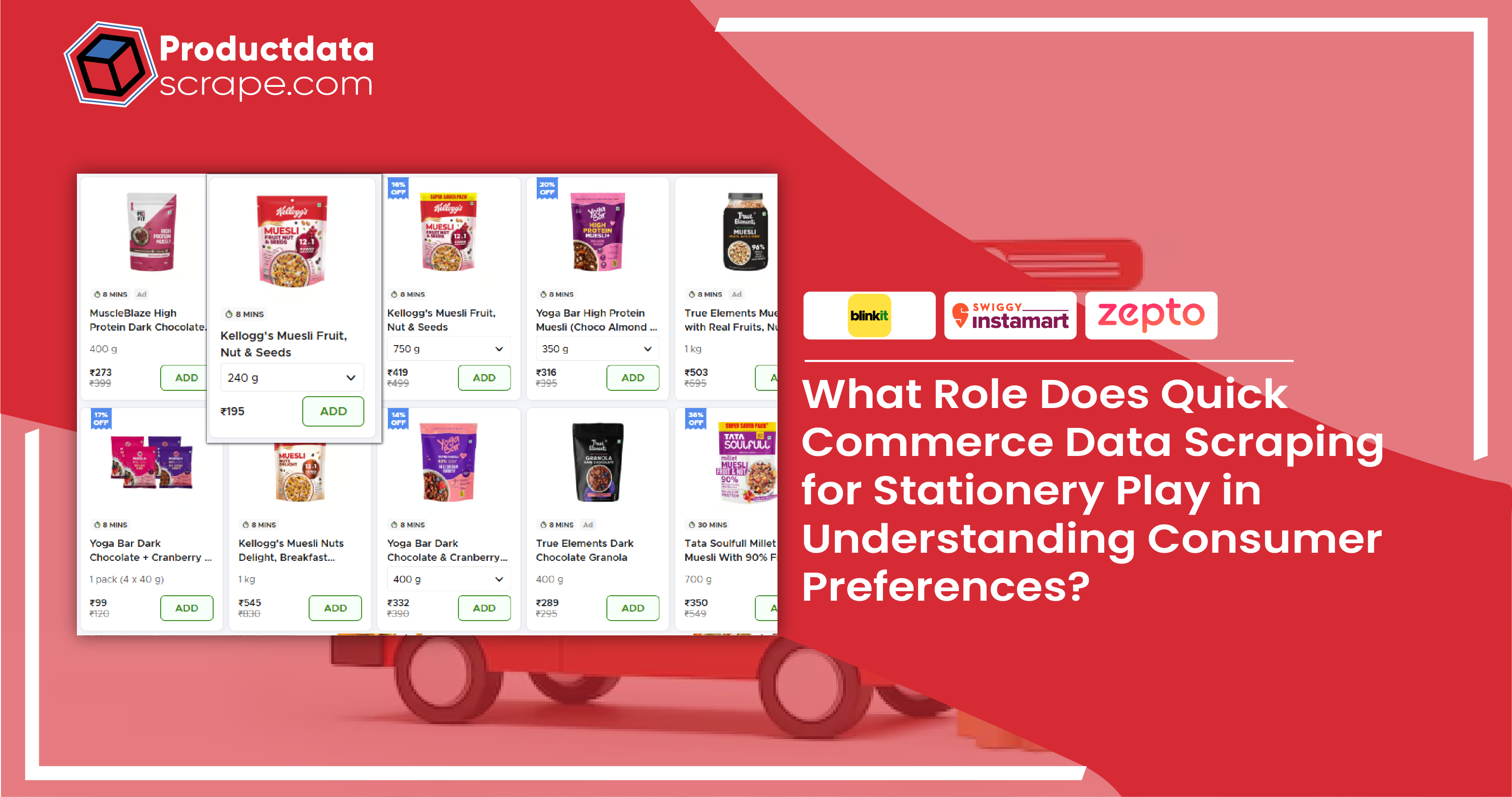
In the fast-evolving world of e-commerce, Quick Commerce Data for Swiggy Instamart, Zepto, and Blinkit for Stationery Category highlights a new era of convenience for consumers. These platforms have redefined how people access everyday essentials, offering ultra-fast delivery services across diverse categories like groceries, personal care, and more. The stationery segment is emerging as a key growth area, driven by its consistent demand for personal and professional needs.
Businesses gain actionable insights into customer preferences, product trends, and pricing strategies by leveraging quick commerce data scraping for stationery. Consumers benefit from quick access to various stationery products, catering to urgent needs like exam preparation or work-from-home setups. The intersection of Web Scraping Grocery & Gourmet Food Data and stationery trends offers unique opportunities for businesses to optimize their offerings, enhance supply chain efficiency, and ensure customer satisfaction in this fast-paced retail environment.
Understanding Quick Commerce in the Stationery Sector
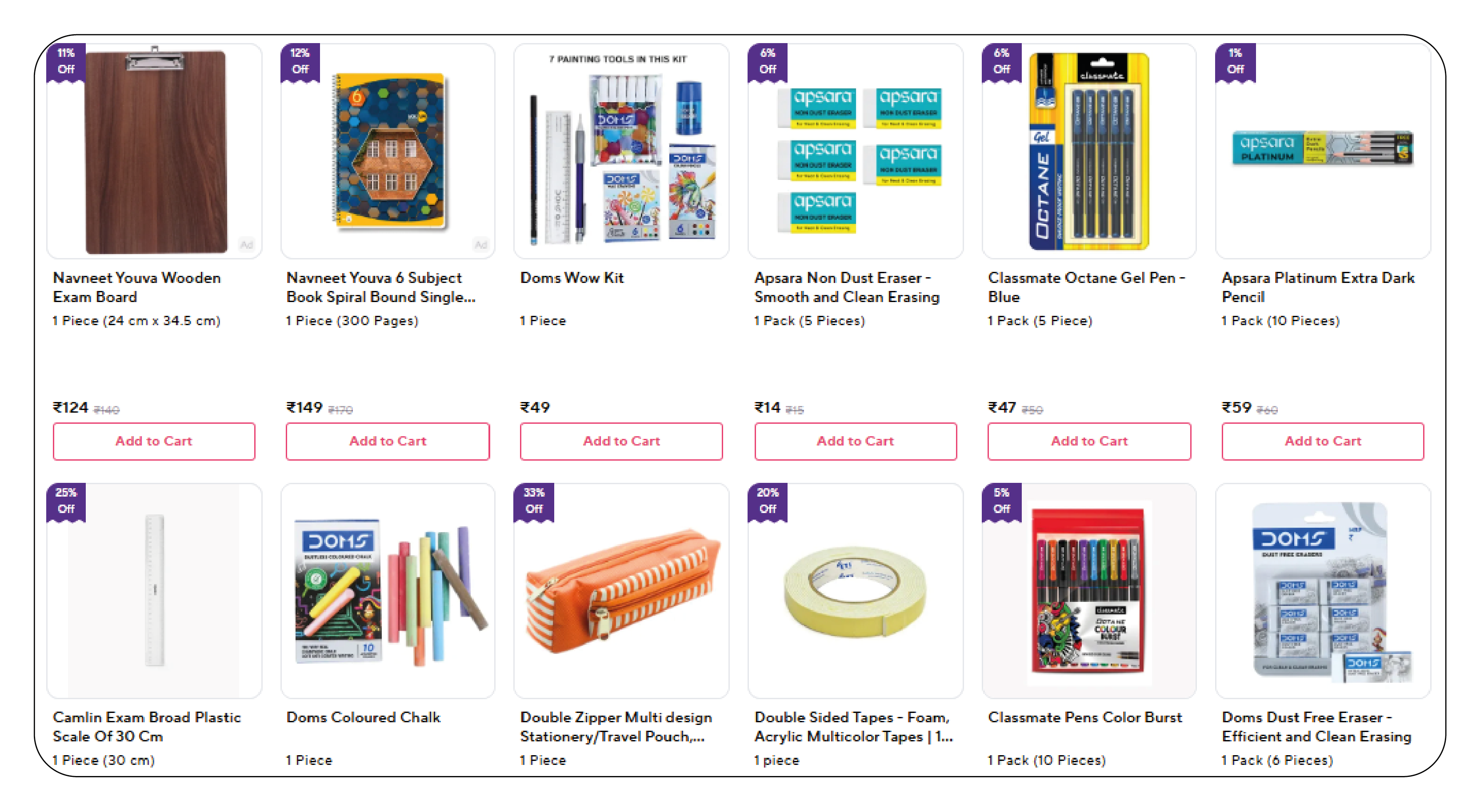
Quick commerce, or q-commerce, epitomizes speed and efficiency. Platforms like Swiggy Instamart, Zepto, and Blinkit promise delivery times as short as 10 to 20 minutes. Well-placed micro-warehouses and a streamlined inventory system support this accelerated delivery model. The stationery segment fits seamlessly into this ecosystem, as its products, ranging from pens and notebooks to office supplies, are lightweight, compact, and easily stored.
For consumers, the availability of stationery on these platforms addresses immediate needs, whether it's a student preparing for an exam, a professional requiring office supplies, or a parent shopping for school essentials. Businesses benefit significantly from Quick commerce scraping for stationery products, gaining valuable insights into consumer behavior. Access to stationery data from Blinkit, Swiggy Instamart, and Zepto empowers better decision-making in inventory planning, competitive pricing, and targeted promotions, making the most of the dynamic quick commerce ecosystem.
Key Features of Stationery Data on Q-Commerce Platforms
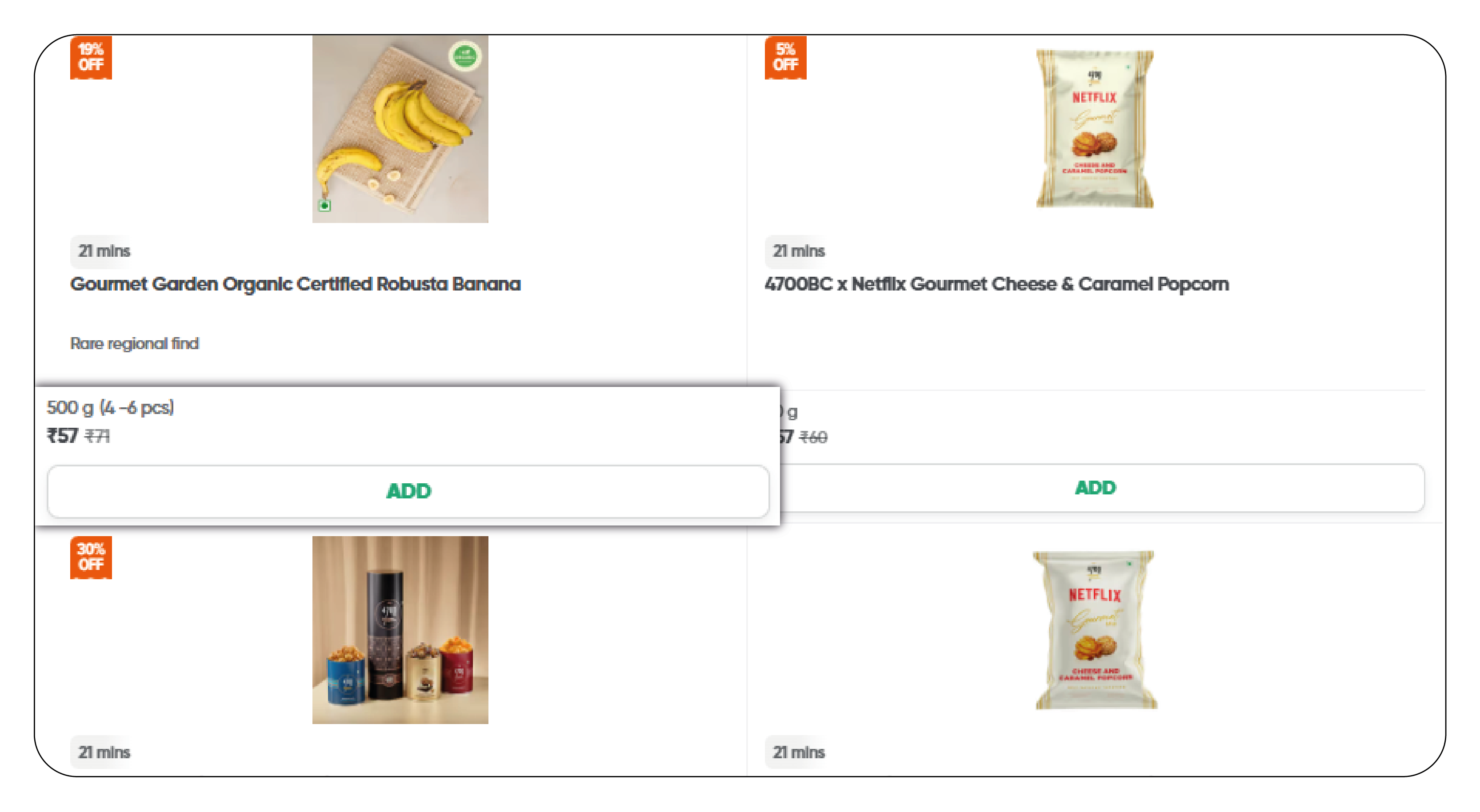
The stationery category on platforms like Swiggy Instamart, Zepto, and Blinkit includes various products. Data on this segment offers insights into the following:
- Product Variety: These platforms stock a wide range of stationery items, including pens, pencils, markers, notebooks, diaries, sticky notes, and art supplies. The inventory reflects consumer demand trends, supported by insights from eCommerce Dataset Scraping, featuring popular brands and affordable options.
- Pricing Strategies: Competitive pricing is crucial for capturing market share in the q-commerce space. Platforms use Pricing Strategies and data analytics to reveal dynamic pricing models, promotional discounts, and bundled offers tailored to attract consumers effectively.
- Consumer Preferences: Price Monitoring trends provide insights into the most sought-after stationery items. For instance, during back-to-school seasons, notebooks and writing instruments see higher demand, while office supplies gain prominence in urban areas with a high concentration of remote workers. These insights often originate from efforts to Extract Swiggy Instamart Grocery & Gourmet Food Data alongside stationery trends.
- Delivery Metrics: Data related to delivery times, reorder frequency, and customer satisfaction helps platforms refine their operations. Maintaining delivery efficiency remains critical to profitability for stationery, which often involves low-cost items guided by real-time analytics from eCommerce Dataset Scraping.
The Role of Data in Driving Stationery Sales
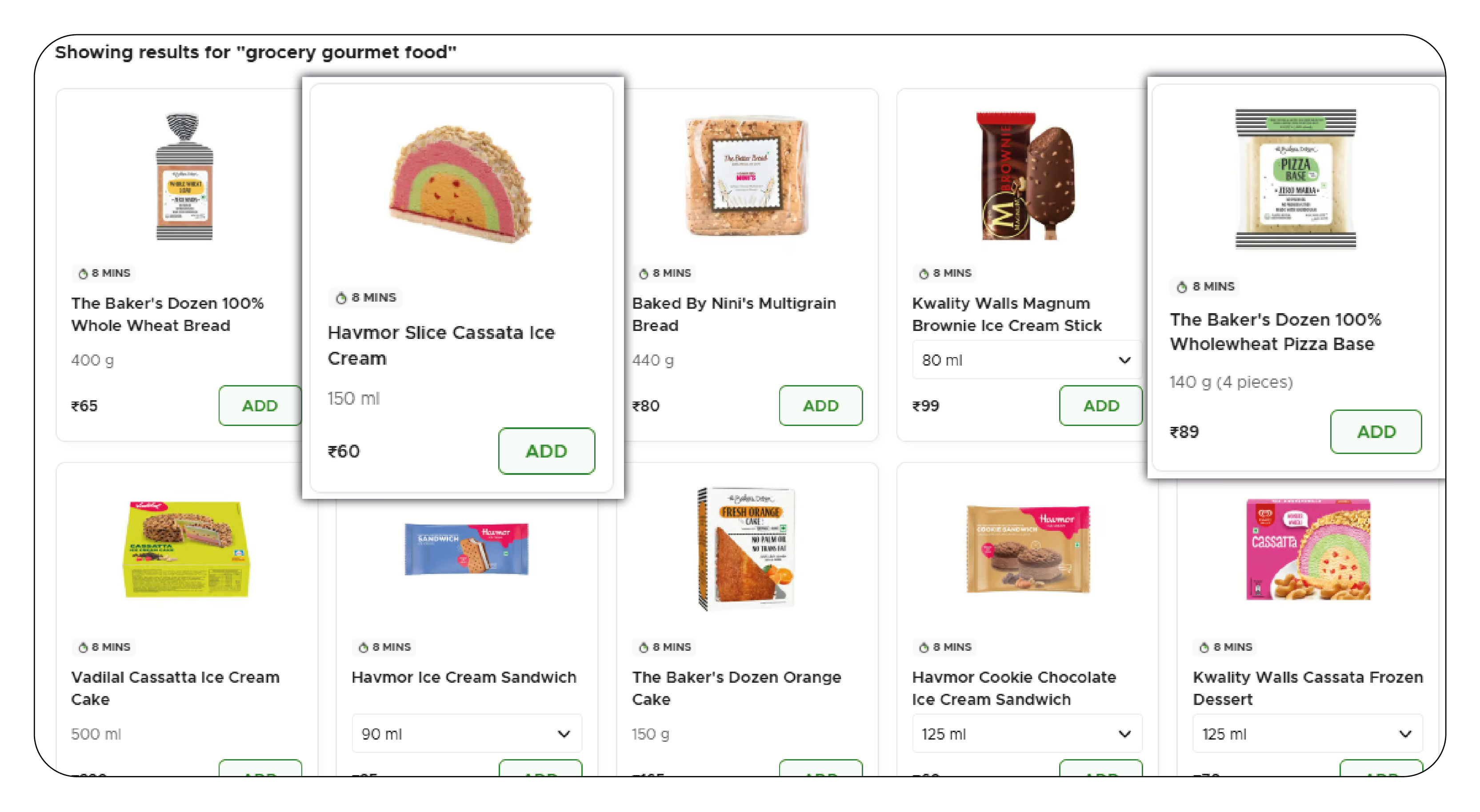
In q-commerce, data is the backbone for optimizing inventory management, enhancing customer experiences, and maximizing profitability. For stationery, quick commerce platforms leverage the following data insights:
- Demand Forecasting: Accurate forecasting is crucial for stocking the right products. By leveraging data through Web Scraping Blinkit Grocery Data, platforms can analyze historical sales and real-time trends to anticipate demand surges, such as during exam periods or the start of the academic year.
- Customer Segmentation: Analyzing demographic and geographic data enables platforms to tailor stationery offerings to specific customer segments. For example, urban professionals may favor premium office supplies, while students often seek affordable, colorful options. Insights gained from efforts to Extract Blinkit Grocery & Gourmet Food Data further refine segmentation strategies.
- Market Trends: Monitoring trends like eco-friendly stationery or digital-friendly products helps platforms remain competitive. Products like reusable notebooks or stylus pens demonstrate shifting consumer preferences toward sustainability and technology integration, captured effectively through data scraping.
- Performance Analysis: Platforms track the performance of individual products and brands using insights from Web Scraping Zepto Data and similar tools. Low-performing items may be replaced or promoted differently, while high-performing ones are featured prominently, ensuring a continuously optimized inventory.
Impact on the Stationery Supply Chain
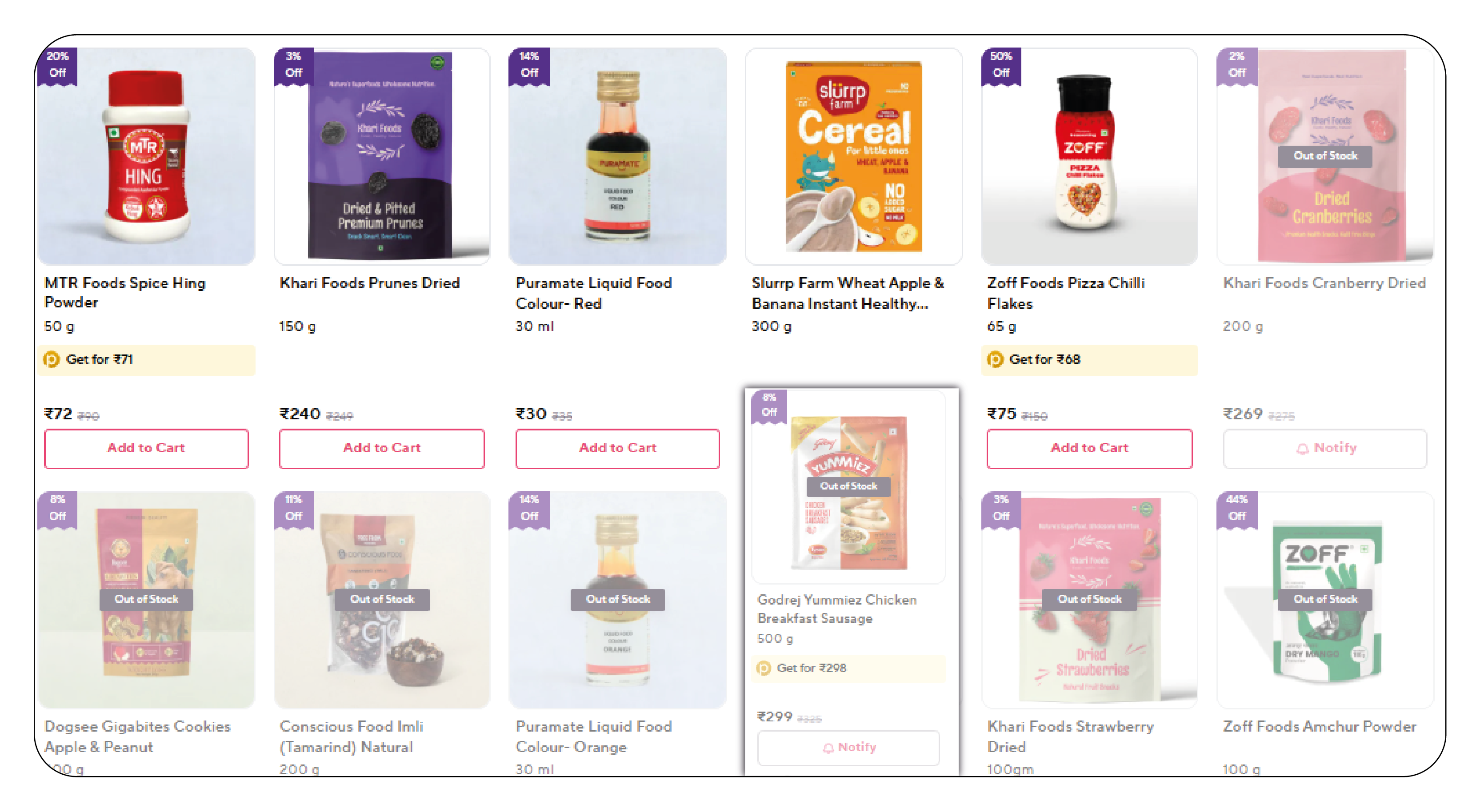
The integration of stationery into quick commerce platforms has reshaped supply chain dynamics. With a focus on rapid delivery, the traditional supply chain has evolved into a hyperlocal model. This model involves:
- Efficient Inventory Management: Micro-warehouses are crucial for maintaining a steady stock of popular stationery items. Platforms use Web Scraping Swiggy Instamart Data insights to implement data-driven inventory management, minimizing overstocking and understocking issues.
- Vendor Collaboration: Platforms collaborate closely with manufacturers and distributors to source high-demand stationery products. Extract Zepto Grocery & Gourmet Food Data to avail real-time sales insights to adjust supply schedules efficiently, ensuring a consistent flow of goods to meet consumer demand.
- Logistics Optimization: The logistics network is optimized for the frequent delivery of small orders. Lightweight stationery items fit seamlessly into this system and place minimal strain on the delivery infrastructure. Platforms integrating Blinkit stationery product data scraping further enhance delivery efficiency and customer satisfaction.
Benefits for Businesses and Consumers

The integration of stationery into the q-commerce model offers several benefits for both businesses and consumers:
For Businesses:
- Increased Sales Channels:
Vendors and manufacturers gain access to a new sales channel, tapping into Swiggy Instamart, Zepto, and Blinkit's convenience-driven consumer base.
- Data-Driven Decisions:
Insights into consumer behavior enable businesses to develop targeted marketing strategies and optimize their product portfolios.
- Brand Visibility:
Featuring products on popular Q-commerce platforms enhances brand visibility and recall, especially for emerging brands in the stationery segment.
For Consumers:
- Convenience:
Quick commerce eliminates the need for trips to physical stores, providing instant access to stationery products.
- Diverse Choices:
Consumers benefit from a wide range of products at competitive prices, often with attractive discounts and offers.
- Enhanced Shopping Experience:
User-friendly interfaces, easy payment options, and quick delivery provide a seamless shopping experience.
Challenges and Opportunities in Quick Commerce for Stationery
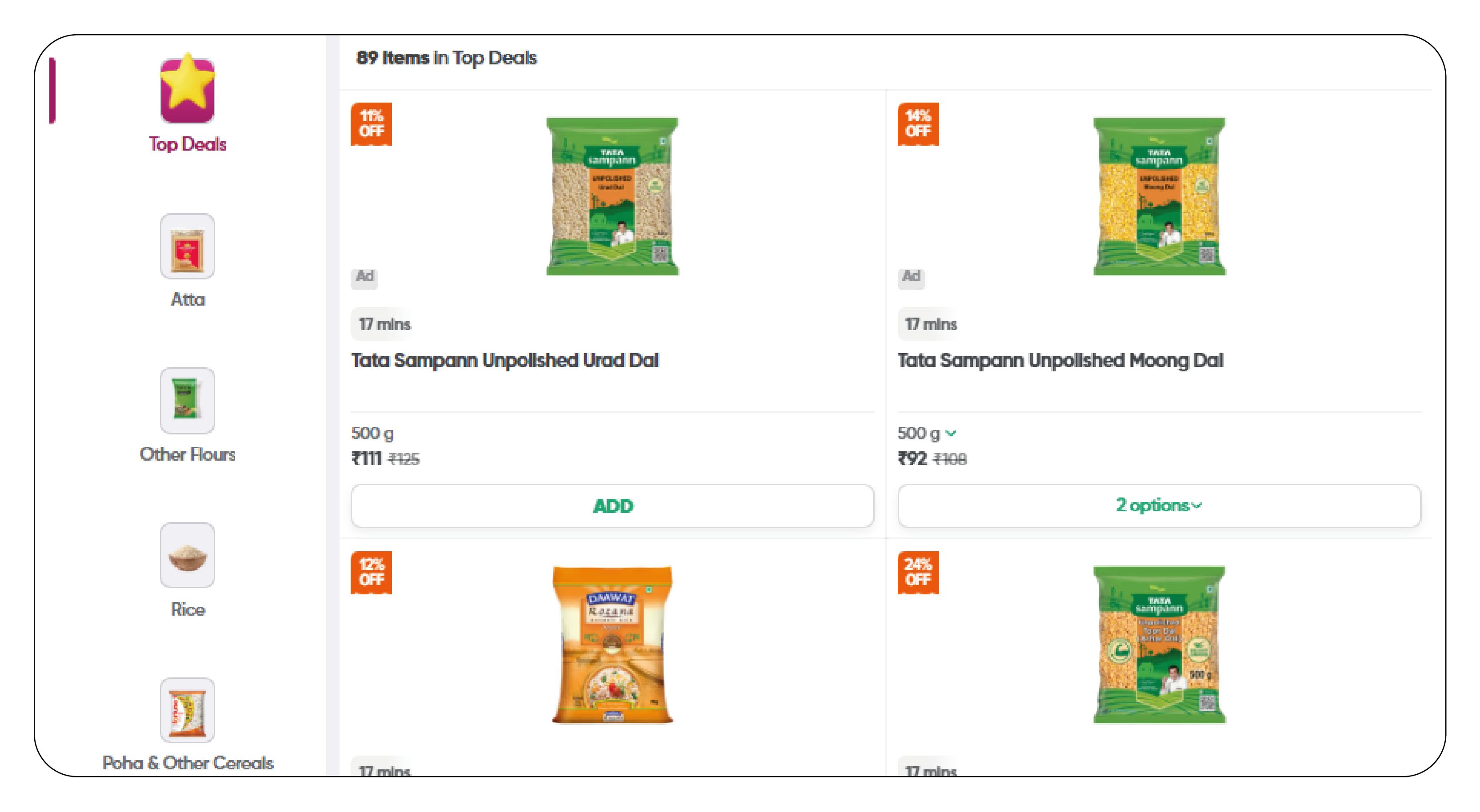
Despite its advantages, the stationery segment in quick commerce faces particular challenges:
- Low Margins: Stationery items are often low-cost, making profitability challenging for platforms that rely on high delivery volumes to offset costs.
- Logistical Constraints: Ensuring the availability of niche stationery products across all locations requires robust logistics and inventory planning.
- Customer Retention: With multiple platforms offering similar services, retaining customers demands continuous innovation and exceptional service quality.
However, these challenges also present opportunities. Platforms can explore value-added services like personalized stationery or subscription models for regular office supplies. Leveraging data to enhance customer engagement through personalized recommendations and loyalty programs can further strengthen their position in the market.
Future Outlook

The stationery category in quick commerce is poised for growth, driven by the increasing digitization of retail and consumer preference for convenience. Platforms like Swiggy Instamart, Zepto, and Blinkit leverage tools like Zepto stationery category data extraction to analyze market trends and refine their offerings to meet diverse consumer needs.
Emerging trends, such as integrating augmented reality for product previews or voice-assisted shopping, promise to enhance the customer experience. Additionally, platforms use insights gained through Swiggy Instamart stationery data scraping to tailor their inventory and pricing strategies effectively.
As sustainability becomes a priority, platforms may expand their eco-friendly stationery options, appealing to environmentally conscious consumers. Leveraging technologies, they can identify unique opportunities in this space. Collaboration with local artisans and manufacturers to promote unique, handcrafted products further enhances differentiation to optimize consumer outreach and engagement.
Conclusion
The stationery category on quick commerce platforms like Swiggy Instamart, Zepto, and Blinkit exemplifies the potential of data-driven retail. By leveraging advanced analytics and efficient supply chain models, these platforms have made everyday essentials, including stationery, more accessible. For businesses, q-commerce opens new avenues for growth and customer engagement while ensuring unparalleled convenience and choice for consumers.
As the sector evolves, the role of data in shaping the future of quick commerce cannot be overstated. From optimizing inventory to understanding consumer preferences, data remains the key to unlocking the full potential of the stationery segment in this fast-paced retail environment.
At Product Data Scrape, we strongly emphasize ethical practices across all our services, including Competitor Price Monitoring and Mobile App Data Scraping. Our commitment to transparency and integrity is at the heart of everything we do. With a global presence and a focus on personalized solutions, we aim to exceed client expectations and drive success in data analytics. Our dedication to ethical principles ensures that our operations are both responsible and effective.








































.webp)






